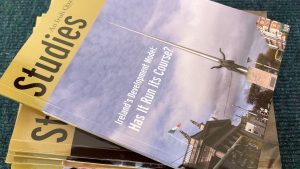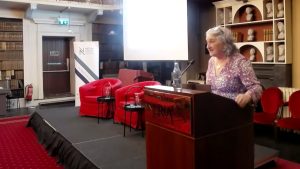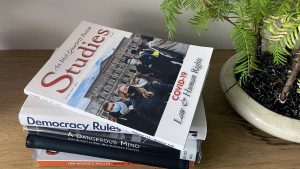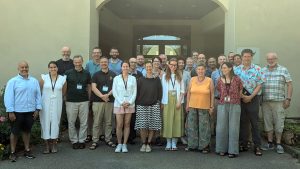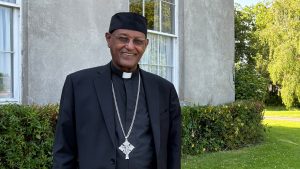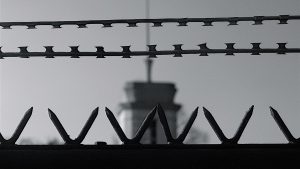Studies: Justice in the here and now

The leading theme of the winter 2023 issue of Studies is the importance of this-worldly justice in the vision of both the Old Testament and the New. There is a belief that has currency among many of Pope Francis’s conservative critics that his emphasis on matters of social justice marks a deviation from the true path of the Church. This, the editorial argues, is decidedly not so, and the top-billed articles in the issue echo this judgement.
The theme of justice in the Gospel is expounded eloquently, and perhaps provocatively, by Peter McVerry SJ in ‘A Kingdom Here on Earth: Jesus the Social Revolutionary’. The prayer in the Our Father, he notes, is for the kingdom of God to come ‘on earth as it is in Heaven’. What are we to make of this prayer for God’s kingdom on earth? For Fr McVerry, it is a prayer for the realisation of God’s vision for humanity, for the coming of a ‘kingdom of non-violence, equality, caring and sharing, reaching out to the unwanted’, a kingdom where power is the power to serve, not to oppress. Jesus challenged the social and political order. His siding with the poor and his insistence of the dignity of every person was ‘a profoundly political act’; but, Fr McVerry clarifies, the kingdom he wishes to establish is ‘in this world, but not of this world’. He concludes with a warning: ‘Unless the Churches rediscover the centrality of social justice to their mission, they will continue to become more and more irrelevant and fade away’.
In ‘Homelessness: Some Theological Reflections’, Suzanne Mulligan casts a theological light on the growing phenomenon of social exclusion through homelessness. She frames the problem in terms of some of the principles which underpin Catholic social teaching, namely human dignity, integral human development, and accompaniment. For one to have dignity they must have, as the Fathers of Vatican II wrote, ‘all that is necessary for living a genuinely human life’, but homelessness deprives people of these things and leaves them vulnerable and exposed. They are hardly capable of well-rounded integral development – spiritual, cultural, relational, and emotional – and they lose the opportunity to exercise ‘contributive justice’, that is to make a positive social contribution that brings them into a community and allows them to flourish there. Mulligan warns about the danger of focusing solely on the provision of shelter to the homeless, ‘to the neglect of the spiritual healing that is also needed’.
In ‘Looking Out onto the World: Global Compact on Education’, Bishop Brendan Leahy describes an initiative of Pope Francis to promote an idea that is present in the vision of the Second Vatican Council, namely that schools and colleges are not merely institutions but communities. This theme from the Council was taken up in later papal documents, especially with Pope Paul VI highlighting that education ‘of the whole person and of every person’ is needed if true progress and development are to be promoted. Bishop Leahy notes the calls from many quarters to recognise a crisis in education, which increasingly neglects the humanities and tends to produce, in the words of Martha Nussbaum, ‘generations of useful machines, rather than complete citizens who can think for themselves, criticise tradition, and understand the significance of another person’s sufferings and achievements’. In launching the Global Compact, Pope Francis identifies commitments or principles that can be adopted, including placing the human person at the centre of education, listening to the voices of children, and encouraging girls and young women to participate fully in educational programmes.
In ‘The Problem of Celibacy in the Clerical Films of Bob Quinn’, Jacob Martin SJ examines two films by Bob Quinn in the 1980s and 90s, Budawanny and The Bishop’s Story, with regard to their treatment of the problems of clerical authority and the power imbalance in the priest/lay relationship. He pays particular attention to the matter of celibacy and the meaning of the physical gestures of the priest protagonists of the movies, especially as they progress towards sexual intimacy.
In a follow-up to his essay on Irish diplomat Leopold Kerney in the Spring 2022 issue of Studies, Barry Whelan tells the fascinating story of Kerney’s determined efforts to forge trade connections with France in the early years of the Free State, mostly as a means of reducing the ability of the British to set the Irish trade agenda. Given Ireland’s dependency on Britain as a trading partner, the country was forced to remain ‘a pastoral country’, supplying Britain with ‘vast supplies of cattle, sheep and dairy produce’. Ireland could not grow into a modern economy while the relationship stayed that way.
In the first of two review articles in this issue, Joseph Dunne takes a lengthy look at Essays in the Phenomenology of Learning: The Challenge of Proximity by Fiachra Long. Long’s book is about the practice of education and, as Dunne notes, is primarily targeted at the Cartesian conception of the disembodied ego. Through a set of discussions of phenomenologists and other modern thinkers, Long reflects on the role and meaning of proximity in education – presence, closeness, wide-awakeness, attentiveness. Dunne commends the book as a substantial contribution to the philosophy of education, and he proposes a number of avenues that could be explored further.
In the second review article Jesuit historian Thomas Morrissey SJ examines The Jesuit Mission in Early Modern Ireland, 1560-1760, a set of essays on Irish Jesuits from the 16th to the 18th century, edited by Mary Ann Lyons and Brian Mac Cuarta SJ. The essays in the collection are not intended to present a comprehensive history of early Jesuit activity in Ireland. Rather, each of them focuses on a specific aspect of the missions. One essay examines the correspondence of three Jesuits involved in the second mission, during the reign of Queen Elizabeth I, when the Catholic Church still held out hope for her conversion and the Irish people were confused about their religious allegiance. Other essays consider the role of women in Jesuit ministry in the 17th century, popular Jesuit preachers in that same era, and the Jesuits and music in early modern Ireland.


